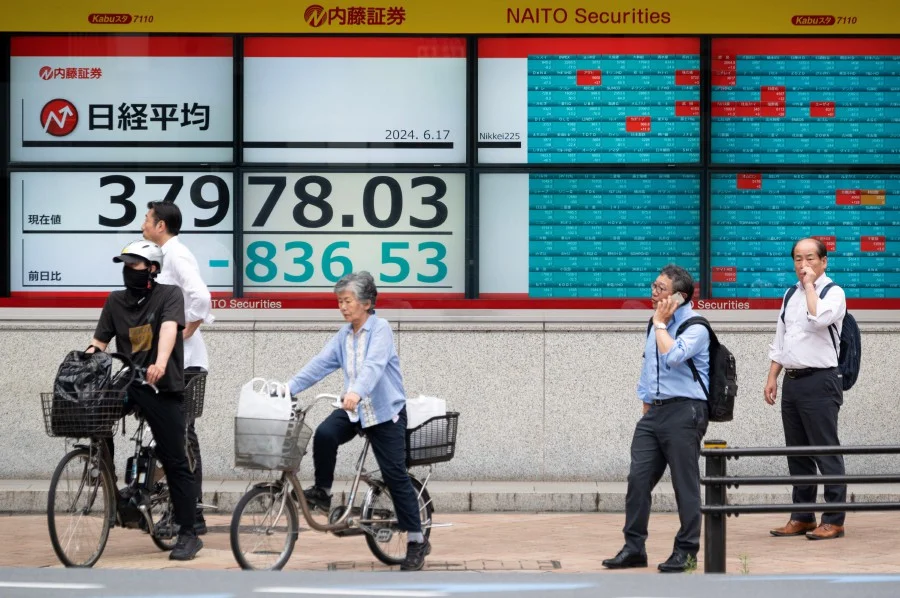European equity futures rose along with Asian stocks as investors shrugged off initial concerns over Nvidia Corp.’s revenue outlook. The dollar headed for an eighth straight weekly gain.
Euro Stoxx 50 futures gained 0.2%, while US contracts were little changed. MSCI’s Asian equity benchmark was flat, with the tech sector performing best. US 10-year Treasury yields eased, while the Bloomberg Dollar Spot Index climbed for a third day.
Shares in Hong Kong and China fell, extending losses as the session, as concern over the nation’s economic outlook persists amid growing threat of stricter tariffs on US exports under President-elect Donald Trump. An index of US-listed Chinese stocks dropped 1% Thursday.
“US exceptionalism remains a fairly strong backdrop in these market conditions,” Taosha Wang, portfolio manager for Fidelity International, said on Bloomberg Television. Artificial intelligence and the potential for pro-growth policies under a Trump administration will support US equities,” she said, while in China following government stimulus, Fidelity is “waiting to see the policy initiatives translate to earnings.”
Asian equities are on pace for their first back-to-back monthly losses this year amid strength in the dollar and lingering concerns over the Chinese economy. Still, the region’s more favorable valuations versus the US market are aiding recovery in some assets as US bond yields surge.
Bitcoin set a fresh high above $99,000 on bets President-elect Donald Trump’s support for crypto and a looser regulatory environment will help the industry. A Fox Business News report suggested Chris Giancarlo, a former chairman of the Commodity Futures Trading Commission who’s known as “Crypto Dad” for his early embrace of digital assets, was being weighed as the first “crypto czar” under the incoming administration.
Federal Reserve Bank of Chicago President Austan Goolsbee said he sees interest rates moving “a fair bit lower,” expressing confidence inflation is easing toward the central bank’s objective.
The greenback rose, pressuring most Asian currencies. The dollar index has climbed over 2% this month, adding to the nearly 3% jump last month, amid escalating geopolitical concerns in Europe. It’s on track for an eighth straight weekly gain, which would be the longest streak in about 14 months.
The yen weakened, erasing gains earlier in the session following inflation data that held above the central bank’s target as expected.
“The US dollar made another march to the upside, with some safe-haven flows likely contributed from Ukraine-Russia geopolitical developments,” said Jun Rong Yeap, market strategist at IG Asia. “We may expect tensions to persist as both sides vie to gain some political leverage ahead of any upcoming negotiations under a Trump administration,” he said.
Elsewhere in Asia, Adani Group companies advanced after a $27 billion rout on Thursday following a US indictment against Gautam Adani over allegations of bribery. The company denied the allegations.
DirecTV notified EchoStar Corp. of its intention to terminate an acquisition of Dish Network Corp. after they failed to win the consent of bondholders for a key debt exchange, all but killing a deal to create the largest US pay-TV service.
Singapore’s economic expansion fared better than initially expected in the third quarter, prompting the city-state to upgrade its growth forecast for this year as recovery gained momentum.
Geopolitical Storm
Geopolitical tensions continued to simmer as Russia said it had launched a new kind of ballistic missile into Ukraine, boosting oil and gold prices. West Texas Intermediate gained for a second day. Gold rose for a fifth straight session.
“Geopolitics always has a potential of introducing volatility in the market and we have seen that with what is happening in Ukraine,” Themis Themistocleous, chief investment officer, EMEA at UBS Wealth Management told Bloomberg Television. “We have been advising clients to include oil into their portfolio, or derivatives of oil, to be able to hedge against potential volatility.”

